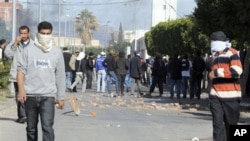As the protests in Tunisia continue, one analyst says education may be driving the demand for political freedom there.
Cornell University African Studies Professor N’Dri Assie-Lumumba was in Tunisia in December when the turmoil began to surface. She says considering Tunisia’s educated population, public protest to political repression is not unexpected.
“I’m not surprised at all, given a number of political and social factors. Education is [a] critical social institution. But acquiring an education is not an end in itself. It has to serve a certain purpose for society, for the individual who acquired that education. And when there is a discrepancy between the projected goal and the actual situation this is a major ingredient in what happened,” she says.
Other factors, she says, include a lack of both democracy and a sense of freedom.
Giving the people a voice
Assie-Lumumba says having a more educated population makes it more that people will speak out when they feel oppressed. She agrees with Egyptian education expert Saad Nagi that whether or not jobs are available, it’s critical to educate the population.
“When you have highly educated people, who do not have jobs, they will find ways to question, to find answers to why they don’t have jobs. And they will try to solve the problem,” she says.
The Cornell professor says there could be many reasons why the public has reacted so strongly now, including the incident in which a Tunisian man set himself on fire in protest last month. She says conditions in Tunisia “made it impossible for him to earn even a basic living by selling produce, instead of using the skills that he learned in the high education institution.”
Assie-Lumumba adds, “It could have happened with any other event. What is happening now has been building for years, for decades literally. So why now? It’s the accumulation of factors. People can’t take it anymore.”
She says even the country’s lawyers, a highly educated group, have not aligned themselves with the government.
“It was reported that 95 percent of them were part of the strike,” she says, “It means as a social group, as a professional group, they don’t associate themselves with the ruling system. So it’s the whole education system in all its complexities – the unemployed, the employed but…unhappy – they have acquired a certain level of sophistication in the analysis, but they cannot apply it to their own lives because of the political repression.”
Tunisia not alone
Assie-Lumumba sees similar tensions in other countries, as well, including Egypt, Syria, Jordan, Algeria, Cameroon and her native Ivory Coast.





